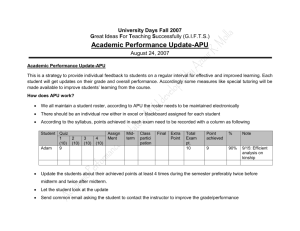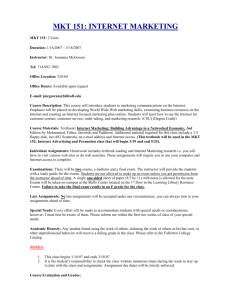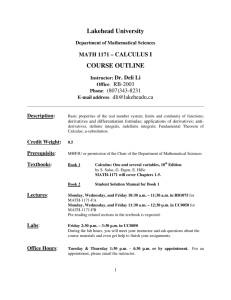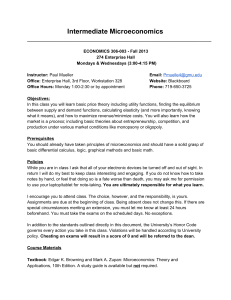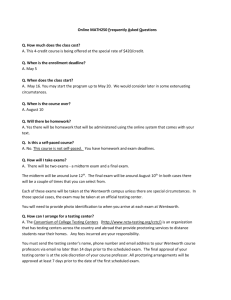Syllabus
advertisement
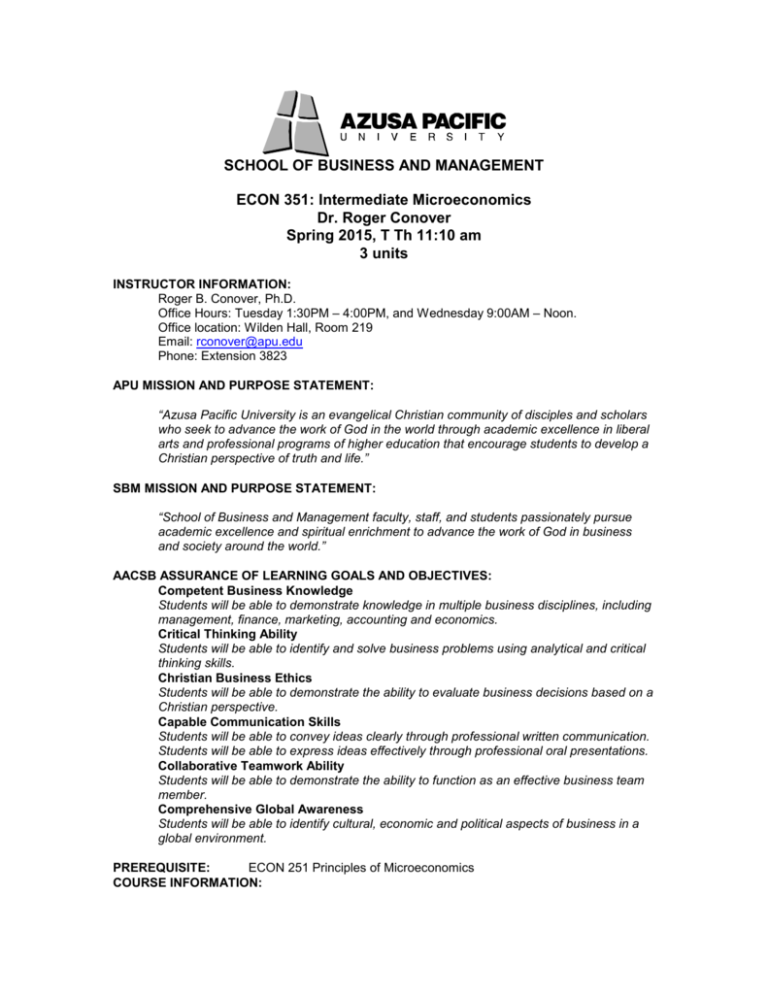
SCHOOL OF BUSINESS AND MANAGEMENT ECON 351: Intermediate Microeconomics Dr. Roger Conover Spring 2015, T Th 11:10 am 3 units INSTRUCTOR INFORMATION: Roger B. Conover, Ph.D. Office Hours: Tuesday 1:30PM – 4:00PM, and Wednesday 9:00AM – Noon. Office location: Wilden Hall, Room 219 Email: rconover@apu.edu Phone: Extension 3823 APU MISSION AND PURPOSE STATEMENT: “Azusa Pacific University is an evangelical Christian community of disciples and scholars who seek to advance the work of God in the world through academic excellence in liberal arts and professional programs of higher education that encourage students to develop a Christian perspective of truth and life.” SBM MISSION AND PURPOSE STATEMENT: “School of Business and Management faculty, staff, and students passionately pursue academic excellence and spiritual enrichment to advance the work of God in business and society around the world.” AACSB ASSURANCE OF LEARNING GOALS AND OBJECTIVES: Competent Business Knowledge Students will be able to demonstrate knowledge in multiple business disciplines, including management, finance, marketing, accounting and economics. Critical Thinking Ability Students will be able to identify and solve business problems using analytical and critical thinking skills. Christian Business Ethics Students will be able to demonstrate the ability to evaluate business decisions based on a Christian perspective. Capable Communication Skills Students will be able to convey ideas clearly through professional written communication. Students will be able to express ideas effectively through professional oral presentations. Collaborative Teamwork Ability Students will be able to demonstrate the ability to function as an effective business team member. Comprehensive Global Awareness Students will be able to identify cultural, economic and political aspects of business in a global environment. PREREQUISITE: ECON 251 Principles of Microeconomics COURSE INFORMATION: University Catalog Course Description: This course expands and deepens the student’s understanding of microeconomics by extending the concepts and tools of economic analysis developed in the Principles of Microeconomics course. The course develops more in-depth models of interactions in society: consumer choice, firm decisions, perfect and imperfect competition. Issues of uncertainty and strategic interaction are addressed as well as extensions to multiple markets. Instructor’s Perspective: Economics is really a way of thinking, a “paradigm.” So, to use a popular phrase, learning economics requires a “paradigm shift-” a change in the way that you view the world. Economics is analytical and structured, using math and graphs to represent or model behavior in the world. We will use algebraic and graphical analysis extensively. Students preparing for graduate school are strongly encouraged to work through the separate calculus-based derivations of the material and to discuss these with the professor. COURSE CREDIT DESCRIPTION: Following the APU Credit Hour policy, to meet the identified student learning outcomes of this course, the expectations are that this 3-unit course, delivered over a 15-week term will approximate: 3 hours / week classroom or direct faculty instruction In addition, out-of-class student work will approximate a minimum of 6 hours each week. STUDENT LEARNING OUTCOMES: By the end of this course, students should be able to demonstrate mastery of the following learning outcomes. The classroom assignments that the instructor will use to assess mastery are identified in the table: STUDENT LEARNING OUTCOME Describe the components of the micro economy and the interrelationships among them. Detail a variety of models of microeconomic decision making and interactions and understand the implications of these models for policy choices. Differentiate among various perspectives on policy recommendations for attempting to improve microeconomic conditions. Explain the effects of government policy on microeconomic activity Discuss the role of values in economic activity and articulate an understanding of a set of core Christian values that impact economic behavior AACSB LEARNING GOAL ASSIGNMENTS USED TO ASSESS Competent Business Knowledge Exam, Homework Critical Thinking Ability Exam, Homework Competent Business Knowledge Exam, Homework Competent Business Knowledge Exam, Homework Christian Business Ethics Homework Required Textbook and Materials: Microeconomics, 5th edition, by Bresanko & Braeutigam (Wiley, 2014) Copyright Responsibilities: Students and faculty are both authors and users of copyrighted materials. As a student you must know the rights of both authors and users with respect to copyrighted works to ensure compliance. It is equally important to be knowledgeable about legally permitted uses of copyrighted materials. Information about copyright compliance, fair use and websites for downloading information legally can be found at: http://apu.libguides.com/content.php?pid=241554&search_terms=copyright COURSE CALENDAR/SCHEDULE: See the end of this syllabus for the schedule. INFORMATION LITERACY AND USE OF THE LIBRARY: Information literacy is defined as “a set of abilities requiring individuals to recognize when information is needed and have the ability to locate, evaluate, and use effectively the needed information” (American Library Association, 1989). In this course, teaching and learning processes will employ the following information literacy standards, as endorsed by the American Association for Higher Education (1999), the Association of College and Research Libraries (2000), and the Council of Independent Colleges (2004). The students in this course will: determine the nature and extent of the information needed. access needed information effectively and efficiently. evaluate information and its sources critically and incorporates selected information into his or her knowledge base and value system. individually or as a member of a group, use information effectively to accomplish a specific purpose. understand many of the economic, legal, and social issues surrounding the use of information and accesses and uses information ethically and legally. This course requires students to complete course assignments using resources available from the University Libraries. Research assistance and subject guides for this course are available at http://apu.libguides.com/ GRADE DETERMINATION: Your grade will depend upon your performance on homework, participation, and exams. No extra credit is available except as may be occasionally announced in class. Students who are concerned about their grades should see the instructor as early as possible during the semester to work out possible strategies for improving your performance. Grades will not be changed after the course is over except in the case of clerical error. Grade appeals procedures may be found in the Student Handbook. In general, the following guidelines will apply to this course. Your specific grade will be determined by the point total that you accumulate throughout the course. Specific Grading Policy: There are 550 points possible in the course: Homework (5 x 50) 250 (90/80/70 scale) Midterm Exam 100 (TBA scale) Final Exam 150 (TBA scale) Participation 50 (90/80/70 scale) 550 Homework problems: Homework problems will be assigned from the end-of-chapter problems and cases. If the assigned questions are discussion questions, your answers must be typed. If they are calculation problems, show your work neatly and in a well-organized manner (but no need to type). While you may discuss the problem sets with classmates, you may not show each other your specific answers (this is to try to prevent intentional or inadvertent copying). You may not discuss the problems with former course students, and you may not simply reproduce an answer from the back of the book if one appears. You must explain your answers. Since we will discuss the homework when it is turned in, no late assignments will be accepted. Exams: The midterm and the final will be true/false, multiple choice and problem solving. You are responsible for providing a Scantron form for both exams. The midterm will be a take home exam. You may not discuss the midterm with anyone other than the course professor. The final will be comprehensive. No notes or study aids (including other students) may be used on the final exam. Calculators? OK. Cell-phones or other electronic aids are not permitted. There will be no make-up exams. If you miss the midterm exam for an unexcused absence, you will receive zero points for the assignment. If you miss the midterm exam for an excused absence (e.g. illness with medical verification or, with prior instructor approval, a University-sponsored event), you will receive the same percentage score on that exam as you get on the final. There is no provision for missing multiple assignments, and you MUST take the final. Participation: Students are expected to come to each class fully prepared. This includes a full and complete reading of the material assigned for the day. The professor will pose questions each class period for discussion, and will evaluate each student’s participation in the discussion on the basis of how well the answers given reflect knowledge of the reading material and how well the student is able to critically evaluate and apply that material. Additionally, specific questions may be assigned from time to time that will be discussed in class. By definition, failure to attend class means that the student is not participating for the class. Grading Criteria for Assignments and Final Grade: GRADE A B C D F CRITERIA Outstanding knowledge regarding details, assumptions and implications of microeconomic analysis; demonstrates superior thinking with information relevant to application, critique, relationship to other information. More than adequate knowledge regarding technical terms, distinctions, ability to begin using information; demonstrates ability to think clearly about the information and its relationship to other information. Basic knowledge needed to function and carry on learning regarding major principles, central terms, major figures; awareness of the field Serious gaps in knowledge, confusion of concepts and categories, inability to recall basic information. Absence of knowledge, incapable of carrying on a conversation about the subject, misunderstands most concepts, confuses all categories. COURSE POLICIES: Student Responsibilities: It is the student’s responsibility to read and understand this syllabus. Questions should be directed to the course instructor within the first week of class. Students in this course are expected to thoroughly read the textbook material in advance of the class meeting when the material will be discussed, and to ask questions about any material that is unclear. Attendance Policy: Students are expected to attend every class, and attendance will be taken. Students who arrive after class has begun will be counted as absent. Points will be deducted from a student’s final score according to the following schedule: 0 to 2 = 0; 3 or more = 20 points each. Students who are late or absent because of an approved university event must inform the instructor prior to such an event. While students are still responsible for assignments due and material presented on such days, this absence will not be counted against their attendance total. Exceptions: With the instructor’s approval of a valid, documented excuse, (e.g. sickness with signed medical excuse, etc.) alternative arrangements can be made. However, the range of acceptable excuses is very limited. In particular, computer hardware or software failures and flight departure times are not valid excuses. Back up your work regularly, and do not schedule your flight out of town for a date before the final exam period. Students who will be absent because of an approved university event must inform the instructor prior to such an event. Students are expected to contact the course professor as soon as possible to obtain approval and schedule make-ups. Academic Integrity: The mission of Azusa Pacific University includes cultivating in each student not only the academic skills that are required for a university degree, but also the characteristics of academic integrity that are integral to a sound Christian education. It is therefore part of the mission of the university to nurture in each student a sense of moral responsibility consistent with the biblical teachings of honesty and accountability. Furthermore, a breach of academic integrity is viewed not merely as a private matter between the student and an instructor but rather as an act which is fundamentally inconsistent with the purpose and mission of the entire university. A complete copy of the Academic Integrity Policy is available in the Office of Student Life, the Office of the Vice Provost for Undergraduate Programs, and online. Any work throughout the course that appears to have been copied from another source violates the standard of academic integrity. You may discuss homework material with other class members as described above. However, if any homework or exam papers appear to be copied, or other cheating occurs, all students involved will receive zero points for that assignment. Second violations will result in all students involved being assigned a grade of “F” for the course. Signing a role sheet for another student is considered forgery and will result in being assigned a grade of “F” for the course. Any other acts of academic dishonesty will be dealt with in a similar manner. In any case of a suspected violation of the standards of academic integrity, the incident will be reported to the Vice Provost’s office and further steps may be taken in accordance with the Academic Integrity Policy of the University. University or Department Policies All university and departmental policies affecting student work, appeals, and grievances, as outlined in the Undergraduate Catalog and/or Department Handbook will apply, unless otherwise indicated in this syllabus. Support Services Please make use of my office hours for any questions, or make an appointment to see me. E-mail works for some questions. Students in this course who have a disability that might prevent them from fully demonstrating their abilities should contact an advisor in the Learning Enrichment Center (ext. 3849) as soon as possible to initiate disability verification and discuss accommodations that may be necessary to ensure full participation in the successful completion of course requirements. SCHEDULE OF CLASS MEETINGS ECON 351: Intermediate Microeconomics DATE TOPIC 1/ 13 Microeconomics: Markets and models Supply and Demand; Equilibrium HAVE READ NOTES 1 2 20 Supply and Demand; Equilibrium Applications, Elasticity --3 27 Consumer Preference; Utility Consumer Choice --4 2/3 Consumer Choice Demand Theory --5 10 Demand Theory --- 17 Firms and Production Functions 6 24 Common Day of Learning (Tuesday) Short-run Costs 7 Th: PS#1 Th: PS#2 Midterm exam out 3/3 Long-run Costs 8 Th: PS#3 Midterm Exam due 3/5 before 4pm. No late exams accepted! March 7 – 15 SPRING VACATION! 17 Perfect Competition 9 24 Competitive Markets 10 31 Monopoly 11 4/7 Capturing Surplus; Pricing 12 14 Monopolistic Competition, Oligopoly 13 21 Externalities 17 T: PS#4 Th: PS #5 FINAL EXAM: CHECK THE FINALS SCHEDULE FOR THE OFFICIAL TIME OF THE EXAM.

